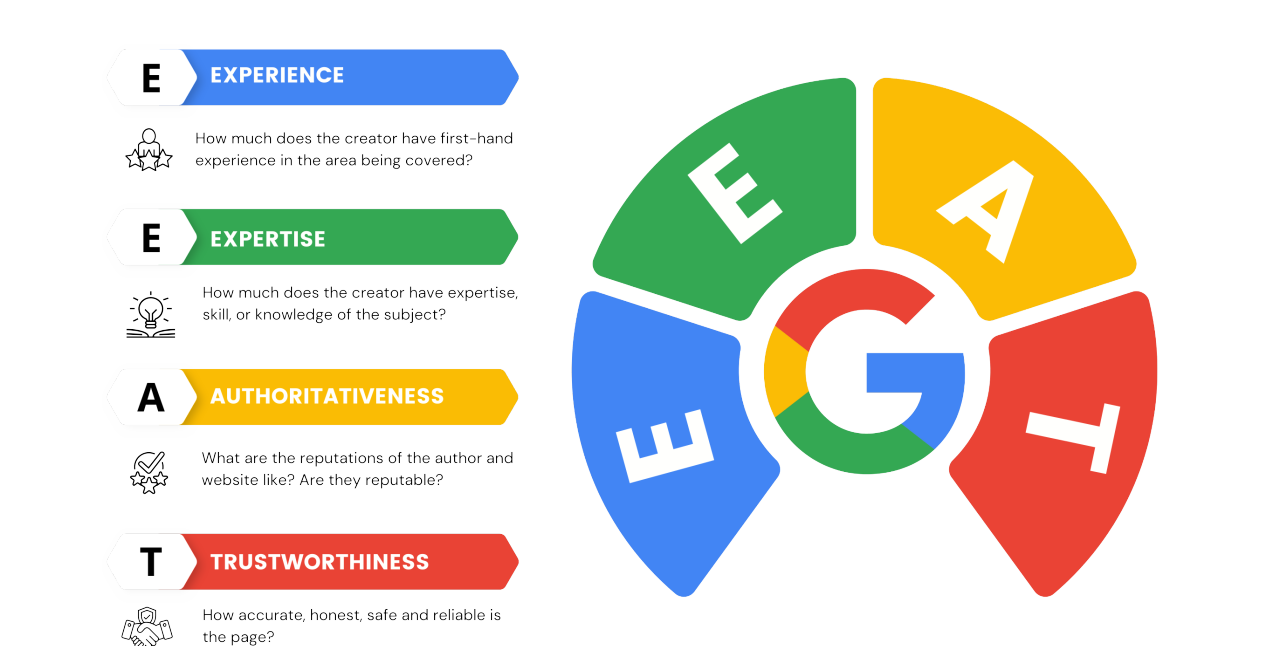
E-E-A-T stands for Experience, Expertise, Authoritativeness, and Trustworthiness. It’s a concept used by Google to determine the quality of a website and its content. Understanding E-E-A-T is important for anyone who wants their website to rank higher in search results.
Imagine you’re trying to find the best recipe for chocolate chip cookies. You’d probably want to look at a website written by a famous chef, right? That’s because you trust their knowledge and experience. Well, Google is kind of like you! It wants to show you the best information when you search for something. That’s where E-E-A-T comes in.
E-E-A-T stands for:
Experience: How much has the person or website worked with the topic?
Expertise: How knowledgeable are they about the subject?
Authoritativeness: Is the person or website considered an expert in the field?
Trustworthiness: Can you believe what the website says? Is it honest and reliable?
Why is E-E-A-T Important?
Google wants to make sure you find helpful and accurate information. That’s why they look at E-E-A-T. Websites with high E-E-A-T are more likely to show up at the top of search results.
Think of it like this: If you search for “best basketball player,” you’d want to see LeBron James or Michael Jordan, right? They have lots of experience, expertise, and people trust what they say about basketball.
Breaking Down E-E-A-T
Let’s look at each part of E-E-A-T and how you can apply it to your website:
1. Experience
Experience refers to the depth of knowledge and practical understanding the content creator has about the subject. Google looks for content created by people who have first-hand experience with the topic.
Example: If you have a blog about cooking, sharing your personal experiences with recipes, such as what worked and what didn’t, shows your experience.
2. Expertise
Expertise is about showing that the content creator is knowledgeable in their field. This can be demonstrated through qualifications, certifications, or a strong background in the topic.
Example: If you’re writing about health, having a medical degree or years of experience in healthcare makes you an expert. This can be highlighted by mentioning your qualifications and linking to your professional profiles.
3. Authoritativeness
Authoritativeness refers to the recognition the content creator or website has in the industry. It’s about being seen as a leader or trusted source of information.
Example: If other respected websites link to your content or you have been cited by well-known organizations, it shows that your website is authoritative.
4. Trustworthiness
Trustworthiness is about making sure that your content is reliable and your website is secure. It includes things like having a secure HTTPS site, clear contact information, and transparent policies.
Example: Including testimonials, reviews, and ensuring your website is free from errors or misleading information can help build trust.
Example of Good E-E-A-T
Imagine you have a website about fitness. Here’s how you can show good E-E-A-T:
Experience: Share your personal fitness journey and results.
Expertise: Highlight your certifications in fitness training.
Authoritativeness: Get featured on well-known fitness blogs or news sites.
Trustworthiness: Make sure your site is secure and provide clear, honest information about your fitness programs.
How Can You Tell If a Website Has Good E-E-A-T?
Look for these clues:
Author: Does the author have experience or knowledge about the topic? Do they have any qualifications?
Website: Does the website look professional and trustworthy? Does it have contact information?
Information: Does the information make sense? Does it seem accurate? Are there any sources to back up the information?
Reviews: What do other people say about the website? Are there positive reviews or comments?
E-E-A-T Example
Let’s say you’re searching for information about dogs.
Low E-E-A-T: A website with cute puppy pictures but no information about dog care.
High E-E-A-T: A website written by a veterinarian with lots of articles about dog health and behavior.
Useful FAQ’s:
1. What is E-E-A-T in SEO?
E-E-A-T stands for Experience, Expertise, Authoritativeness, and Trustworthiness. It’s a set of criteria used by Google to evaluate the quality and reliability of web content.
2. Why is E-E-A-T important for my website?
E-E-A-T is important because it helps Google determine if your content is trustworthy and credible. High E-E-A-T can improve your website’s search engine ranking, leading to more visibility and traffic.
3. How can I demonstrate experience on my website?
Share personal experiences and practical insights related to your content. For instance, if you run a travel blog, write about your actual travel experiences, tips, and stories.
4. What are some ways to show expertise on my website?
Highlight your qualifications, certifications, and professional background. Including author bios, linking to professional profiles, and citing credible sources can also help.
5. How do I establish authoritativeness for my site?
Gain backlinks from other reputable websites, get mentioned or cited in industry publications, and participate in recognized organizations or forums in your field.
6. What steps can I take to improve trustworthiness?
Ensure your website is secure with HTTPS, provide clear contact information, maintain a professional design, and be transparent about your policies and procedures.
7. Does E-E-A-T apply to all types of websites?
Yes, E-E-A-T is important for all websites, but it’s particularly crucial for YMYL (Your Money or Your Life) sites, which include those that offer advice or information on health, finance, and safety.
8. Can user reviews and testimonials impact E-E-A-T?
Yes, positive reviews and testimonials can enhance trustworthiness. They show that real users have had good experiences with your content or services.
9. How often should I update my content to maintain good E-E-A-T?
Regularly update your content to keep it accurate and relevant. This demonstrates that you’re committed to providing the best information and can enhance your expertise and trustworthiness.
10. What is the role of backlinks in E-E-A-T?
Backlinks from reputable sites act as endorsements of your content’s quality and authority. They signal to Google that your site is a trusted source of information.
Enhancing your website’s reputation and search engine rankings may be achieved by comprehension and use of E-E-A-T concepts.






